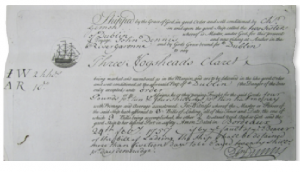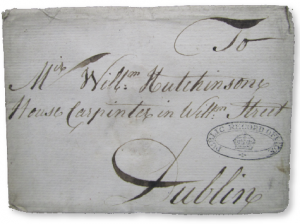The Bordeaux–Dublin letters, 1757: the voice of an Irish community abroad
Published in Early Modern History (1500–1700), Issue 5 (September/October 2013), News, Volume 21In January 2011, while working at the British National Archives at Kew, Dr Tom Truxes (Glucksman Ireland House and NYU) discovered a fragile, dusty collection of documents that had been seized aboard an Irish trading vessel in March 1757. A British privateer had intercepted the Two Sisters of Dublin on its return to Ireland from the French port of Bordeaux, the site of a thriving Irish expatriate community. King George II’s declaration of war in May 1756 prohibited commercial contact with the French by all British subjects, rendering ships and cargo involved in trade with the enemy subject to confiscation.
Among the documents taken off the Two Sisters was a packet of 125 letters, most written by members of the Irish community in the Bordeaux region to family, friends and business associates in Dublin, Cork, Limerick, Galway and other places in Ireland. Nearly all of the letters date from early January to the first week of March 1757, a time of high anxiety in a community that had been cut off from its homeland by war. Eighty-five of the letters were still unopened at the time of discovery. Twenty-five of the letters are in French.
On a return visit to Kew in January 2012, Dr Truxes located court records associated with the capture and prosecution of the Two Sisters of Dublin. Documents in this collection (which includes 25 bills of lading, English and French permissions to cross enemy lines, depositions describing all aspects of the voyage, and a detailed inventory of the goods carried aboard the vessel on its voyage from Bordeaux to Dublin) will allow a complete retelling of the fateful voyage of the Two Sisters.
The breadth and scope of material in the 1757 Bordeaux–Dublin letters is truly remarkable and speaks eloquently of strong connections that linked Ireland and the Irish expatriate community in France. Taken as a whole, the collection provides an extraordinary window into a long-vanished world. Correspondents range from wealthy merchants in the Irish wine trade to young Irishmen being educated in France and Irish prisoners-of-war incarcerated in the notorious Bayonne Castle. Particularly striking is the strong presence of women. The correspondence offers a snapshot of social networks that were Atlantic in scale and that transcended imperial boundaries.
Dr Truxes and his co-editors—Prof. Louis M. Cullen (TCD) and Dr John Shovlin (NYU)—have prepared a publication, The Bordeaux–Dublin letters, 1757: correspondence of an Irish community abroad. This publication, in cooperation with the British Academy and in partnership with Oxford University Press, will appear in October 2013.
Glucksman Ireland House, NYU, will mount an exhibition, ‘The Bordeaux–Dublin letters, 1757: the voice of an Irish community abroad’, as well as hosting an academic conference as part of Ireland House’s twentieth anniversary in October 2013. Plans are also going forward to send the exhibition to venues in Ireland, Britain and, with luck, the Bordeaux region of France. ‘The 1757 Bordeaux–Dublin letters’ project will bring long-overdue attention to the rich legacy of the Irish community abroad in the eighteenth century. HI
http://irelandhouse.fas.nyu.edu.


















